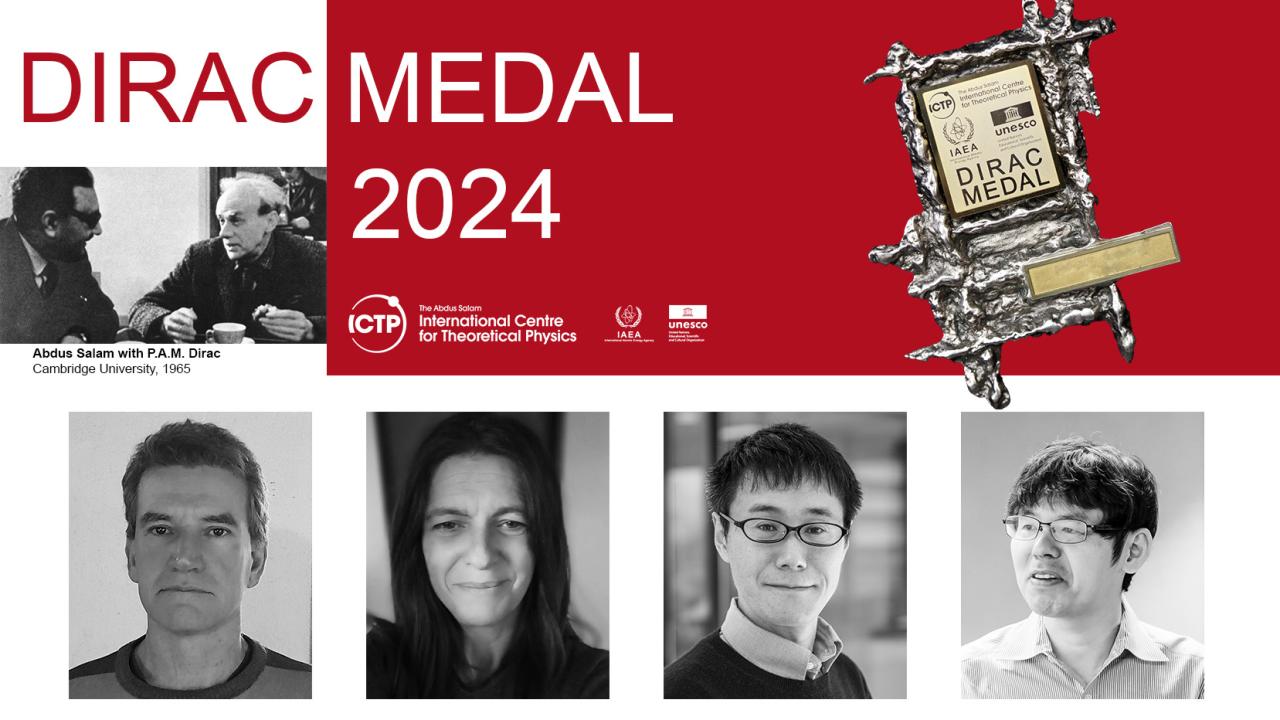
ICTP has awarded its 2024 Dirac Medal to four physicists who have made pioneering contributions to the understanding of quantum entropy in gravity and quantum field theory.
The winners are:
- Horacio Casini, National Scientific and Technical Council (CONICET) and Bariloche Atomic Centre, Argentina
- Marina Huerta, CONICET and Bariloche Atomic Centre, Argentina
- Shinsei Ryu, Princeton University, United States
- Tadashi Takayanagi, Kyoto University, Japan
The award cites “their insights on quantum entropy in quantum gravity and quantum field theories”.
One of the most surprising features of quantum physics is the ability of particles to continue being correlated even when far apart. This property, called "entanglement," is the focus of the work of the four scientists honoured by ICTP this year.
“The 2024 Dirac Medallists have made pioneering contributions to our understanding of different aspects of quantum entanglement," says ICTP Director Atish Dabholkar. "The work of Ryu and Takayanagi has revealed a fascinating and deep connection between quantum mechanics and information theory on one hand, and the geometry of space-time and gravity on the other," he explains, adding, "The work of Casini and Huerta uses the properties of quantum entanglement entropy to derive important general results about the structure of quantum field theories." The 2024 Dirac Medal therefore rewards research that brings together two aspects of physics - quantum mechanics and gravity - whose unified description has been the 'Holy Grail' of theoretical physicists for more than half a century.
"Their research was conducted in different corners of the world -- in Argentina, Japan and the United States -- as if there were some intellectual correlations between them," Dabholkar continues. "In fact, part of the work of Casini and Huerta was done while at ICTP in Trieste. To my mind this is a manifestation of the essential unity of physics and the notion that science is the common heritage and creation of all humanity, a founding belief of ICTP," says Dabholkar. "In these troubled times, this Dirac Medal underscores that science transcends boundaries, and offers a common language that can facilitate conversations across cultures and political differences."
Established in 1985, the ICTP Dirac Medal recognises important contributions to the field of theoretical physics. Medallists include leading figures in the discipline, many of whom went on to receive even more important awards, such as the Nobel Prize and the Fields Medal. This year’s selection committee consists of two Nobel laureates and other eminent scientists, all previous medallists, and is chaired by Dabholkar.
ICTP Director Atish Dabholkar talks about quantum entanglement and the contributions of the 2024 Dirac Medallists in this video:
Scientific Summaries, Dirac Medallists’ Contributions to Quantum Entropy
The work of the four winners as described by the 2024 Dirac Medal Selection Committee is summarised as follows:
Quantum entropy, or von Neumann entropy, is a measure of the amount of information associated to a quantum state. It is sometimes called “entanglement entropy” when one considers a subsystem of a larger system that is in a pure state.
In 2006, Ryu and Takayanagi made a ground-breaking proposal that the von Neumann entropy of a gravitational system is given by the area of a minimal area surface in the spacetime geometry. It is related to, but not the same as, the famous Bekenstein-Hawking formula for the entropy of a black hole in terms of the area of its horizon. This proposal, now known as the Ryu-Takayanagi formula, has had many far-reaching implications for elucidating aspects of black holes and holography, where it also led to important applications to strongly interacting systems.
Casini and Huerta studied aspects of quantum entropy for quantum field theories, focusing on the entropy of subregions, and then applied these results to the study of renormalization group flows. In 1+1 dimensions they showed that the entropy of an interval decreases monotonically under the renormalization group flow, providing an alternative proof of the well-known c-theorem. They extended this reasoning to 2+1 dimensional field theories, where they showed that the entropy of a circular subregion in 2+1 dimensional subregion decreases under renormalization group flow. Casini and collaborators further extended these ideas to 3+1 dimensions.
Casini used properties of quantum relative entropy to provide a precise formulation and an elegant proof of a version of the Bekenstein bound.
About the 2024 Dirac Medallists
Horacio Casini is a researcher with the National Scientific and Technical Council (CONICET), and the Bariloche Atomic Centre, in Argentina. He is a recipient of the 2015 New Horizons in Physics Prize.
Marina Huerta is a researcher with CONICET and the Bariloche Atomic Centre, in Argentina. She is a recipient of the 2015 New Horizons in Physics Prize.
Shinsei Ryu is a professor of physics at Princeton University. He has received numerous awards for his research, including the Simons investigator award, Nishina Memorial Prize, and the 2015 New Horizons in Physics Prize.
Tadashi Takayanagi is a physics professor at Kyoto University. He has been awarded the Yukawa-Kimura Prize in 2011, the Nishinomiya-Yukawa Memorial Prize in 2013 and the New Horizons in Physics Prize in 2015.
ICTP's Dirac Medal is awarded annually to scientists who have made significant contributions to theoretical physics. It is given in honour of P.A.M. Dirac, one of the greatest physicists of the 20th century and a staunch friend of the Centre, on Dirac's birthday, 8 August. An international committee of distinguished scientists selects the winners from a list of nominated candidates. The members of this year’s selection committee are: Alessandra Buonanno, Atish Dabholkar (chair), Michael Green, David Gross, Juan Maldacena, Giorgio Parisi, Subir Sachdev.
















